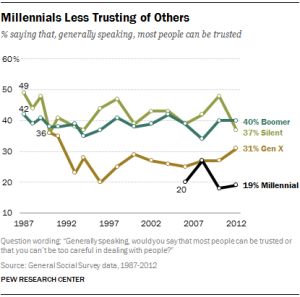 Pew Research recently published some research titled, Millennials in Adulthood. (You can read much more here.)
Pew Research recently published some research titled, Millennials in Adulthood. (You can read much more here.)
I was made aware of this research from a piece in USA Today about college basketball players and trust when it quoted one small part of this research. The study used an often used survey question; “Generally speaking, would you say that most people can be trusted or that you can’t be too careful in dealing with people?” Only 19% of Millennials said that most people can be trusted – less than the other generations as the graph here shows.
This article isn’t really about Millennials. There will be no fist pounding, rationalizing, pontificating or justifying. This article is really about that question – and your answer to it. Here it is again.
“Generally speaking, would you say that most people can be trusted or that you can’t be too careful in dealing with people?”
So what is your answer?
There are likely lots of factors that play into your answer, and you might say, it depends on the situation. I’ll grant you that, so let me be a bit more pointed.
“Generally speaking at work, would you say that most people can be trusted or that you can’t be too careful in dealing with people?”
Now what is your answer?
I am not going tell you what your answer should be, but I will tell you this – you answer will have an impact the amount of trust you have in your relationships at work.
What do I mean?
Think about your own experiences. If you know (or sense) that someone trusts you, don’t you work a little harder, pay a little more attention and expect a bit more of yourself?
If you are like most people the answer is yes – because we don’t want to “let people down.”
The fact is that generally people tend to live up to or down to the trust that is placed in them.
Trust is a noun and a verb – the more of the verb you do, the more of the noun you get. (Tweet that.)
If you want more trust, start by trusting more.
You can choose to judge others (or prejudge them), or join in with them and create working relationships that build trust, expand workplace productivity and satisfaction.
Are there risks involved in trusting more and trusting first?
Of course there are.
But are there risks to waiting, being cautious and having people prove themselves?
Yes.
I am not suggesting we trust anyone off the street to do a complicated procedure (scalpel anyone?) without proper training. But don’t rationalize away my point either.
The starting point for trust is that trust is a choice. It is about you and your beliefs more than the people you are trusting.
It is your choice. And know that you are already choosing, whether you have thought about it or not.
I hope this article has helped you think about the choice and given you more information to consider.
I urge you to choose wisely and choose intentionally.

In business, trust must start at the highest level of leadership. Trust among the business leaders is paramount to accomplishing business goals and objectives. This doesn’t mean the leadership team can stop meeting and measuring successes and failures, but it does mean things only need to be said once, daily monitoring between leaders isn’t necessary and in fact is counter productive, and most importantly it means leadership can count on each other to “get the job done” without having to add followup notes to their already-lengthy to-do list.
Interesting point of view;
It is hard don´t think of our vulnerability when we trust in someone. However, people who usually feel freedom and happiness, like me, they usually trust in people and we are outgoing because we don´t have anything to hide.
It is true that, in return, people trust in you, even the person most closed one. That is greatful but a big responsability!….
Finally, i want to point that I realized that life is like a mirror, it depends how you smile in it in, you will get the same smile back…
This is an interesting graph. It believe it was Covey who said that “Trust is the foundation of a relationship.” A leader must be trustworthy or the leader will not be effective. In leadership it is very important to earn the trust of people by doing what you say you will do.